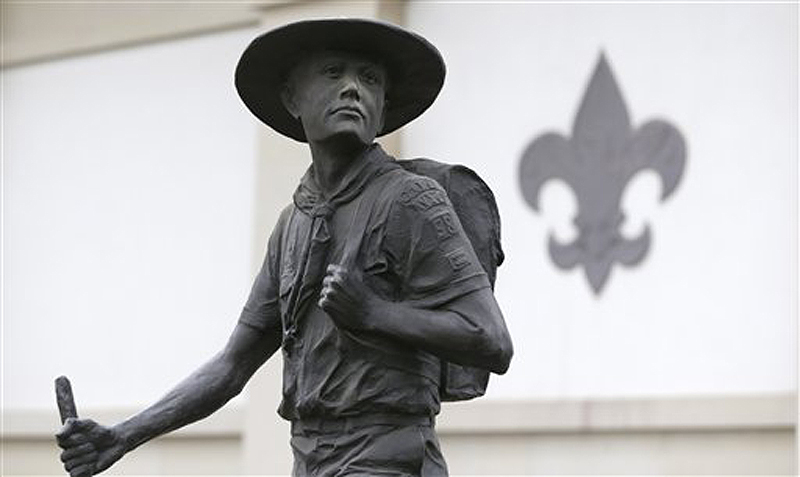On the eve of today’s vote by the Boy Scouts of America on whether to start allowing troops to admit openly gay Scouts and leaders, Maine troops and their sponsors wouldn’t say what they plan to do.
Representatives of Maine’s two Boy Scouts councils — the Pine Tree Council in Portland and the Katahdin Area Council in Orono — have said they will stay out of the decision-making and don’t intend to dictate what troops and packs should do.
“It doesn’t matter what I think,” said Marshall Steinmann, executive director of the Katahdin Area Council and an Eagle Scout. “It’s going to come down to what these local troops and their partners think is best.”
Robert Lemont, commander of American Legion Post 202 in Topsham, which sponsors a troop, said he expects his organization to go along with what the national Boy Scouts organization decides. He said he personally doesn’t see a need to ban gay Scouts or leaders.
“It comes down to freedom, and that’s a freedom we all fought for,” he said.
Matt Wickenheiser, who has led a Cub Scouts pack for the last six years, said that once the national decision is made, he plans to bring together pack leaders with parents and guardians for “a discussion about how inclusive we want our group to be.”
“We’ll respect all opinions and have a frank discussion about what potential changes could look like for our pack,” he said. “Then the other leaders and I will talk with our chartered organization about what we as a pack would like to do. We have always been very open and accepting as a pack. That’s a strength and a hallmark. I don’t necessarily see us retreating from that.”
Phone messages and emails sent over two days to eight other troop leaders in southern Maine were not returned.
Nationally, the American Legion, which sponsors many troops, has come out against lifting the Boy Scouts’ ban on gay Scouts, although individual posts can determine membership rules as long as they adhere to national bylaws.
The national Knights of Columbus organization, which is affiliated with the Catholic Church, has been vocally opposed to lifting the ban, but has left decisions to its local councils.
Dave Guthro, a spokesman for the Roman Catholic Diocese of Portland, said, “No matter what the Boy Scouts of America decide, the diocese would still support the charters for parish-sponsored troops.”
Catholic parishes and Knights of Columbus councils sponsor 29 Boy Scouts troops in Maine.
“I think there is a misunderstanding by some that the Catholic Church would not support Scout troops that allowed those with a same-sex inclination or orientation,” Guthro said. “That would be blatant, unjust discrimination.”
The Christian Civic League of Maine, which has been a vocal opponent of same-sex marriage efforts in Maine, has urged Mainers to call on the Boy Scouts to “stand firm and reaffirm its oath to remain ‘morally straight.'”
The possibility that the ban will be lifted has generated mostly negative responses on the conservative blog As Maine Goes.
The Boy Scouts has long had religious ties. An estimated 70 percent of troops nationwide have religious partners.
But not every charter organization is a church or civic organization.
Bill Exley, with Turner Barker Insurance in Portland, said his company has sponsored a Cub Scout pack for years. Asked whether the national organization’s decision would change anything, Exley said he would take a “wait and see” approach.
On Monday, a coalition of Boy Scout councils from across the country, led by the Utah-based Great Salt Lake Council, asked the Boy Scouts of America to postpone its decision.
The coalition said the policy shift “flies in direct contradiction” to the results of a two-year review that led the organization to affirm its ban.
Neither Maine council is part of the coalition.
Leaving the decision to individual troops could lead to uncomfortable discussions. Parents of Scouts in the same troop may be on opposite sides, and parents could seek a troop or pack that more closely aligns with their beliefs, even if it’s in another community.
Steinmann, with the Katahdin Area Council, said he expects parents will have a wide variety of opinions about whether to admit gay Scouts and leaders.
He said the focus on lifting the ban distracts from the Scouts’ mission of “character development and values-based leadership training.”
Eric Tarbox, director of the Pine Tree Council, said his council already has a zero-tolerance policy against “sexual advocacy or inappropriate behavior,” and he doesn’t think a policy shift would change that.
Asked how lifting the ban would affect leaders and troops in the Pine Tree Council, Tarbox said only that the question is “a tough one.”
The ban on gays has cost the Boy Scouts of America large sponsorships, including those from UPS and Merck. Both companies said they will not donate to the Boy Scouts of America as long as it bans gays.
The Girl Scouts organization, by contrast, has no such ban.
Boy Scout membership has declined significantly in recent years, particularly among younger boys. In 1998, there were nearly 2.2 million Cub Scouts. Last year, the number was about 1.6 million.
The Boy Scouts of America has attributed the decline to broad changes in society, but it has faced persistent criticism about its ban on gays.
Send questions/comments to the editors.


